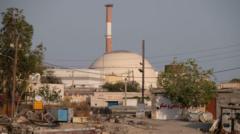U.S. Secretary of State Marco Rubio recently emphasized strong American opposition to Venezuela's territorial claims during a visit to Guyana, warning of potential military action if necessary.
Venezuela's Territorial Claims Prompt U.S. Response: Rubio Warns of Consequences

Venezuela's Territorial Claims Prompt U.S. Response: Rubio Warns of Consequences
Secretary of State Marco Rubio asserts the U.S. will respond to Venezuelan aggression over disputed territory with Guyana, as tensions rise amid oil production activities.
In Georgetown, Guyana, on March 27, 2025, Secretary of State Marco Rubio reiterated a firm stance against Venezuelan territorial ambitions that threaten Guyana's sovereignty, especially in the context of the Essequibo region—the oil-rich area currently under Guyanese control.
“Consequences” would follow any aggressive moves made by Venezuela, Rubio declared at a joint press event alongside Guyana's President, Irfaan Ali. He condemned the claims as illegitimate, highlighting concerns over the Venezuelan government's ties to narco-trafficking. Rubio asserted the importance of the U.S. partnership with Guyana in countering these threats.
Venezuela has intensified its claims on the Essequibo region, which constitutes approximately two-thirds of Guyana and is crucial for upcoming oil production activities by ExxonMobil. Amid these tensions, the Secretary of State carefully avoided detailing specific military responses but hinted at the capacity of the U.S. Navy, positioning the U.S. as a potential backer of Guyana's sovereignty.
President Ali expressed gratitude for U.S. support in safeguarding Guyana's territorial integrity.
This diplomatic episode highlights growing regional anxieties as Venezuela faces economic struggles, leading to external territorial ambitions that could spark international tensions involving oil-rich zones and their strategic importance.
“Consequences” would follow any aggressive moves made by Venezuela, Rubio declared at a joint press event alongside Guyana's President, Irfaan Ali. He condemned the claims as illegitimate, highlighting concerns over the Venezuelan government's ties to narco-trafficking. Rubio asserted the importance of the U.S. partnership with Guyana in countering these threats.
Venezuela has intensified its claims on the Essequibo region, which constitutes approximately two-thirds of Guyana and is crucial for upcoming oil production activities by ExxonMobil. Amid these tensions, the Secretary of State carefully avoided detailing specific military responses but hinted at the capacity of the U.S. Navy, positioning the U.S. as a potential backer of Guyana's sovereignty.
President Ali expressed gratitude for U.S. support in safeguarding Guyana's territorial integrity.
This diplomatic episode highlights growing regional anxieties as Venezuela faces economic struggles, leading to external territorial ambitions that could spark international tensions involving oil-rich zones and their strategic importance.



















